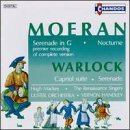| All Artists: Moeran, Handley, Ulster Orchestra Title: Serenade in G Members Wishing: 2 Total Copies: 0 Label: Chandos Release Date: 9/30/1992 Genre: Classical Styles: Opera & Classical Vocal, Chamber Music, Symphonies Number of Discs: 1 SwapaCD Credits: 1 UPC: 095115880821 |
Search - Moeran, Handley, Ulster Orchestra :: Serenade in G
 | Moeran, Handley, Ulster Orchestra Serenade in G Genre: Classical
|
Larger Image |
CD DetailsSimilar CDs |
CD ReviewsMoeran and Warlock's Mediaeval capers. K. Farrington | Missegre, France | 04/14/2000 (5 out of 5 stars) "This is a fun CD for the most part and the residuum that is not fun is sublime. Let me qualify this. Both Warlock (Phillip Heseltine) and Ernest Moeran were important figures in the English Musican Renaissance of the 1920-30's. They were born in the same year, thirty two after Delius, twenty two years after Vaughan Williams and eleven after Bax. They were both infatuated for a time by the chromatic sliding structures and the contemplative aestheticism of the older master. Heseltine, when he was an eighteen year old schoolboy at Eton had actually corresponded with Delius. He must have come across very impressive as a correspondent. Delius was no sucker for juvenile sycophancy and yet he took Heseltine seriously, eventually becoming a personal friend of his. As Peter Warlock the composer he led the way in his friendship with Moeran due to his stronger personality. Two works on this CD relate to this idolisation. The Serenade for Strings of Warlock is a beautiful work which was written to celebrate Delius' 60th birthday in 1923 (actually he was 61; Delius had simply got it wrong). The melody is redolent of Delius' own in his 'A Song before Sunrise', one of his impressionistic pieces for small orchestra. Warlock retains Delius' fastidious brushwork but is not impressionistic here though. His work is instead a full blooded disquisition on the rhythms and harmonies of small scale Delius but to this he adds his own strengths of fine form. In Warlock's refined calligraphy, the ripe Delian melody winds its way around the strings, eventually coming to a strong but ruminative climax, and ends up with a smiling, plump cadence complete with a final plucked chord. To any lover of the Delius of the smaller orchestral pieces this is a must and we can only join Warlock in worshipping at the Temple of Grez-sur-Loing. Delius would never have produced a work like this, for this is no generic product. It is essential Warlock and every bar is authentic! I have had three versions of this work on vinyl and this is as good as any of the others. The pace is Delius' own, something that used to be thought of (well in the 1960's, anyway) as almost mystical and peculiar to Beecham. Thankfully this was all hype and this recording among many proves it can be done by others as well. The Nocturne is Moeran's offering at the same altar of Delian idolatory but he plumbs for an evening Nocturne complete with a serenading baritone. Robert Nichols elegaic words are almost de trop for this wonderful piece is sheer poetry as pure sound and certainly deserves more than the occassional hearing. Typically, as a summing up of Delius' rapture music this is the more successful of these two but will be probably far less patronised by concert programs. Warlock was an avid student and lover of English Tudor and other early music and his Capriol Suite he introduced the crunchy harmonies of his era into the dances of the Elizabethan period. The Serenade by Moeran is exactly the same in concept as Warlock's Capriol Suite as a crossover work but was written 18 years after Heseltine's death. He had repudiated some parts ex post facto but thankfully this recording restores them and the result is a substantial work brimming over with melodies, jumping rhythms and startling harmonic jumps. All in all, great fun and beautifully played!"
|

 Track Listings (16) - Disc #1
Track Listings (16) - Disc #1
